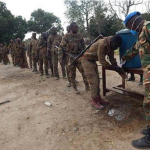
The N’Djamena peace accord, signed on April 19, 2025, between the government of the Central African Republic, the rebels from the Return, Rehabilitation, and Reclamation (3R) and the Union for Peace in the Central African Republic (UPC), continues to face challenges due to repeated violations by parties involved.
The agreement aims to help reintegrate rebels into civilian life and to disband their movements, as outlined in the 2019 peace accord. However, the recent resurgence of violence in Nzakoundou caught the authorities off guard, highlighting their lack of preparedness for the disarmament process.
On Saturday, June 28, heavily armed 3R rebels emerged in large numbers from the bush in Nzakoundou, Yeme council. Their overwhelming presence overshadowed the Central African Republic National Army (FACA) soldiers. Outnumbered, FACA soldiers had no choice but to retreat from Nzakoundou, fleeing to the bushes 15 kilometres away along the Paoua highway, leaving the village under the control of the 3R rebels. This retreat has instilled panic among the villagers, who are concerned that tensions may escalate if the rebels’ basic needs are unmet.
Meanwhile, in the Ouaka region, UPC rebels have initiated the disarmament process in Bokolobo, Maloum, Mbomou, and Nzacko. Motivated by promises of reintegration into the national army, UPC combatants voluntarily laid down their arms. However, their primary challenge is the lack of food and other essential supplies.
The situation is different in Yaloke, situated 225 kilometres from Bangui, the republic’s capital, where disarmed former Anti-Balaka militia led by General Jeudi have been complaining of the absence of food rations and access to water, a recurrent problem in the several sites earmarked for disarmament. At Moyo, the situation is particularly disquieting because the rebels who are still armed have been terrorising the population and taking whatever they need by force.
The Central African Republic is facing significant challenges with its disarmament and reintegration programme, which has been ongoing since 2017. According to President Touadera, this programme has successfully disarmed 5,000 combatants and dissolved nine armed groups. However, Moyo’s lack of cantonment zones and the necessary resources to support disarmed combatants hinders progress.
This issue is further compounded by the ineffectiveness of the FACA soldiers, who cannot secure areas like Nzakoundou. The residents there are living in constant fear of violence, especially since 2023, when the 3R rebels set fire to multiple homes and killed civilians, prompting the United Nations Multidimensional Integrated Stabilisation Mission in the Central African Republic (MINUSCA) to send troops to the village and its surrounding areas.
The departure of FACA soldiers has created a significant dilemma: If the rebels choose to lay down their arms, the state is expected to take responsibility for them. However, without access to food or opportunities for reintegration, these former combatants may resort to acts of banditry to survive, including nighttime robberies targeting local populations. This troubling trend is already evident in areas like Dawala, Thicka, and Sataigne and has the potential to escalate into a new source of violence. Such developments could undermine the progress achieved through the N’Djamena peace accord.
